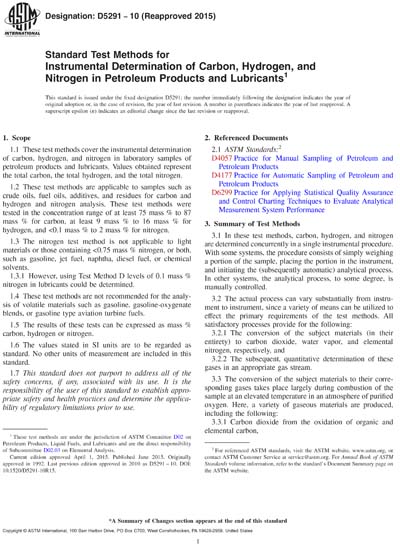Historical
ASTM D5291-10(2015)
Standard Test Methods for Instrumental Determination of Carbon, Hydrogen, and Nitrogen in Petroleum Products and Lubricants
1.1 These test methods cover the instrumental determination of carbon, hydrogen, and nitrogen in laboratory samples of petroleum products and lubricants. Values obtained represent the total carbon, the total hydrogen, and the total nitrogen.
1.2 These test methods are applicable to samples such as crude oils, fuel oils, additives, and residues for carbon and hydrogen and nitrogen analysis. These test methods were tested in the concentration range of at least 75 mass % to 87 mass % for carbon, at least 9 mass % to 16 mass % for hydrogen, and <0.1 mass % to 2 mass % for nitrogen.
1.3 The nitrogen test method is not applicable to light materials or those containing <0.75 mass % nitrogen, or both, such as gasoline, jet fuel, naphtha, diesel fuel, or chemical solvents.
1.4 These test methods are not recommended for the analysis of volatile materials such as gasoline, gasoline-oxygenate blends, or gasoline type aviation turbine fuels.
1.5 The results of these tests can be expressed as mass % carbon, hydrogen or nitrogen.
1.6 The values stated in SI units are to be regarded as standard. No other units of measurement are included in this standard.
1.7 This standard does not purport to address all of the safety concerns, if any, associated with its use. It is the responsibility of the user of this standard to establish appropriate safety and health practices and determine the applicability of regulatory limitations prior to use.
Content Provider
ASTM International [astm]






